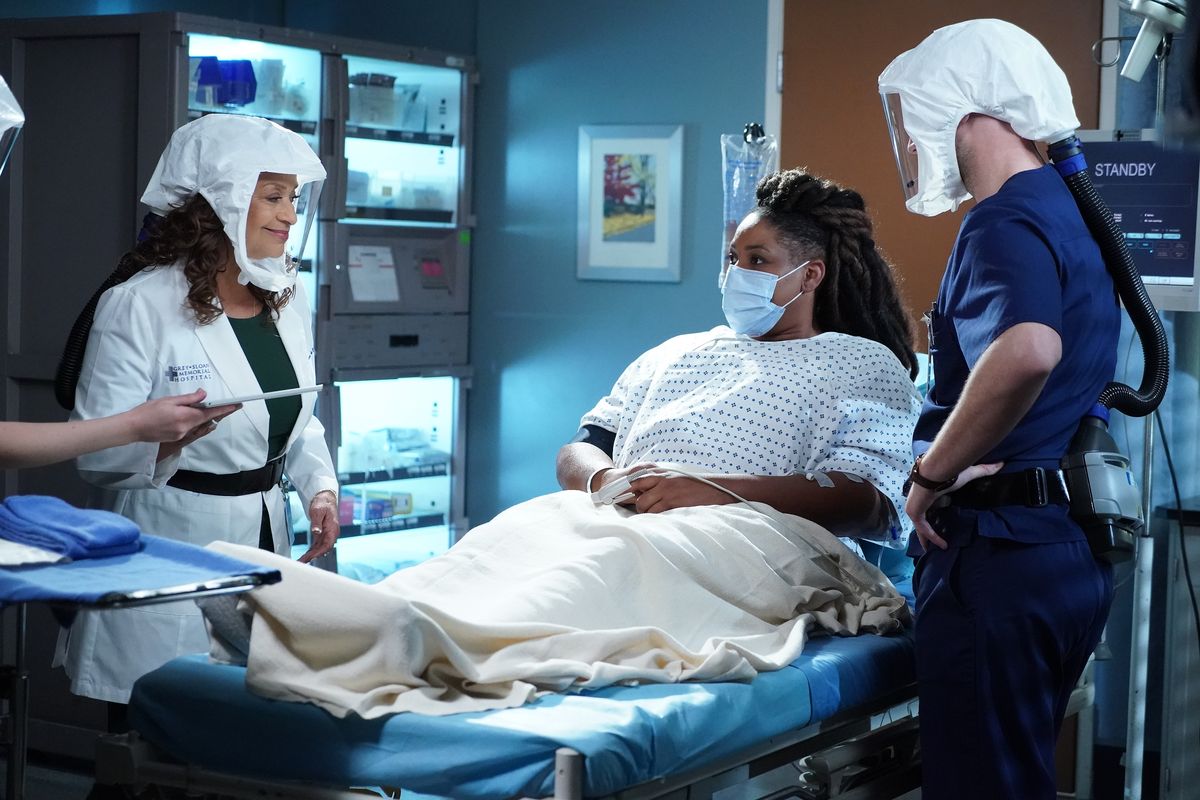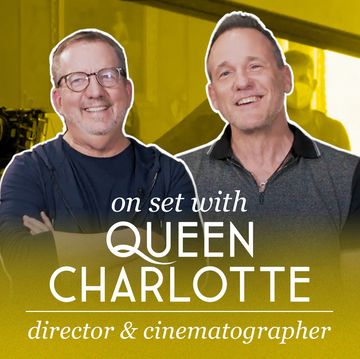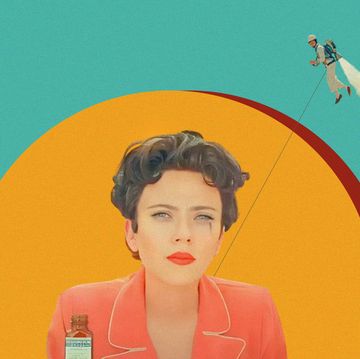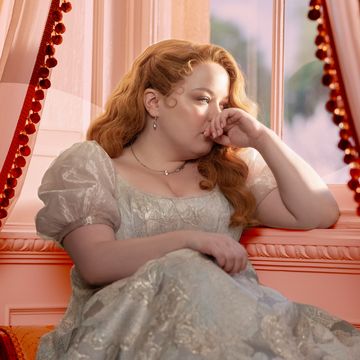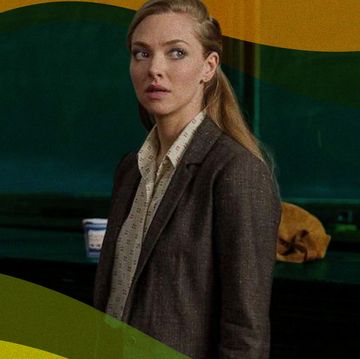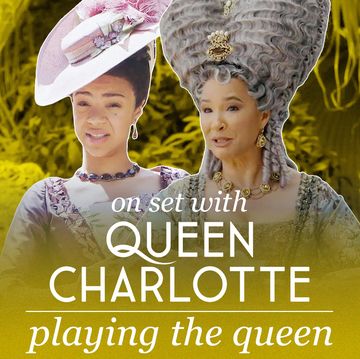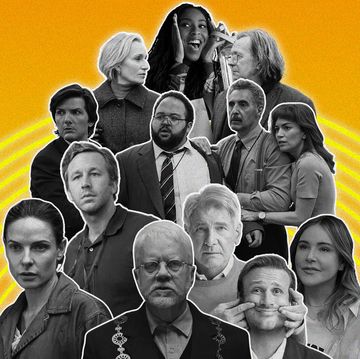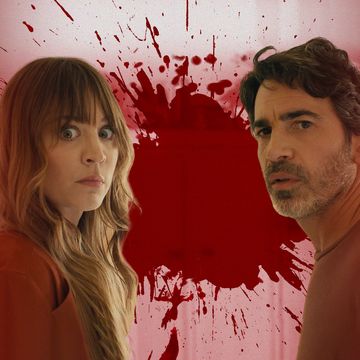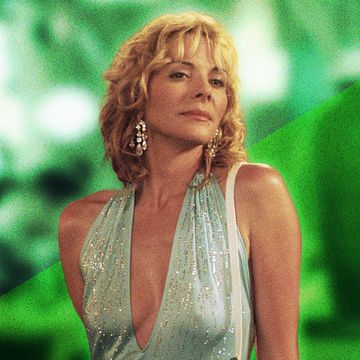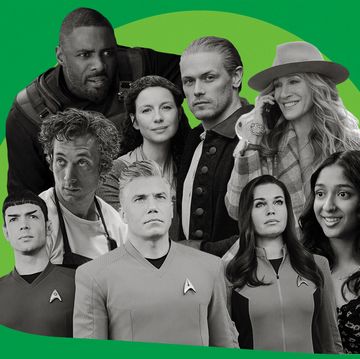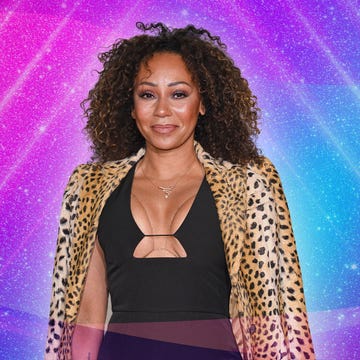In last night’s episode of Grey’s Anatomy, “Breathe,” we were graced with some very exciting and very welcome blasts from the past: McSteamy (Eric Dane) and Lexie (Chyler Leigh) joined Meredith, still trapped in a coma, on the beach-in-her-brain for some real heart-to-hearts. It was the perfect way to convince Mer she needed to get her brain back to consciousness and her butt back into Grey Sloan Memorial.
Elsewhere in the episode, we met someone we haven’t heard about before but who was just as welcome. Azure Antoinette appeared as Dr. Hayes’ sister-in-law Irene, who came to the hospital with bad abdominal pains and a history of multiple sclerosis (MS). Hayes was indeed worried since his boys adore their auntie, and she’s really the only family they’ve all got left. His sister is also the only one Hayes has who can care for his children while he’s busy saving tiny lives in pediatrics.
“We initially wrote the story last season,” says showrunner Krista Vernoff, who met Antoinette this past summer during a workshop through Convocate, and was captivated by her presence, “but it got cut when the season was shortened due to Covid. We wrote the character with MS because we’ve been working to include more people living with disabilities because that is the reality in the world, but it’s wildly underrepresented in television.”
In battling MS, Antoinette suffers from a lifelong disease that disproportionately affects Black women. It’s an autoimmune disorder that attacks the brain and nerves, and, while little is still known about its origins, there are medicines and treatments that can help to reduce the risks, collateral damage, and symptoms. Antoinette is also a longtime Grey’s fan as well as a successful poet, author, speaker, and entrepreneur, and playing Irene has not only been a high point in her career but in her life.
“She is a powerhouse,” says Vernoff. “She is a dynamic human being who is living with MS, [and] I thought it would be amazing to have her play Hayes’ sister-in-law. Disabilities are underrepresented in television, and allowing actors who are disabled to play characters with disabilities is even rarer. I asked Azure if she had ever done any acting, and she said a little bit, and she was so game. So ultimately we wrote the part with her in mind. Debbie Allen worked with her, privately coaching her on the acting — which she ultimately did so beautifully.”
We got to talk with Antoinette on the eve of her acting debut about what it’s like to appear on her favorite TV drama, how MS is such an unknown for almost everyone, and why characters like Irene are important on TV.
VALENTINA VALENTINI: You’re not an actor by trade, so how did this all come about?
AZURE ANTOINETTE: This past summer, I had the pleasure of doing a workshop with Krista. I am a poet and a public speaker by trade, and I was paired up in a session with Kevin McKidd and Josh Radnor to talk about how to help people get through the uncertainty of what had happened with Covid. I do a lot of teaching, slam poetry, and I did a lot of musical theater, so I really do enjoy connecting with people and working very deeply in the art of storytelling. But I — as so many people were — was having a really tough time when everything kicked off with the pandemic because MS is very driven by outside factors. So, your stress and things that are happening in your life adversely affect how the disease populates and shows up in your body, and, when that happens for me, depending on where I am in relapse or a flare-up, it can cause a lot of vocal strain and tremors, or sometimes it manifests as seizures. During our session, I wrote an open letter in one of the prompts to my MS, and Krista reached out a short time after that to ask if I would ever consider acting. And I was so honored to even have the opportunity to audition. It’s like the culmination — the serendipity of it all takes my breath away.
VV: What was serendipitous about it?
AA: So, in 2013, I sold a pilot to ABC Family, and we were working with Pretty Little Liars’ Keegan Allen. We passed an audio room or some sort of finishing room for Grey’s, and I just stopped and took a picture with my head by the sign. I mean, if I could just be a corpse on Grey’s Anatomy, that would be super cool. I would be okay to be dead on Grey’s. I remember in college it used to be Dawson’s Creek, and then that ended, thank god, and then Grey’s came. And every Thursday, it was a ritual, a rite of passage for us. We would get together, and we prepped ourselves to fall apart, and we ate something terrible, and we would try to use those monologues in our everyday lives; it all felt very real. So now, it’s been so full circle because it was January 28, 2013, when I took that photo and posted it on my Facebook, and it was January 31, 2021, when I sent in my audition for this episode. To see that all come to pass, it’s just beautiful.
VV: Well, you didn’t get to play a corpse, because Irene survived this episode! Makes you think — will we see more of Irene down the line?
AA: I mean, Irene lived! And on Grey’s, when you live, that’s big. Because people die on Grey’s. So when I made it out, I was like, “Oh, well, this is incredible. This was great.”
VV: Did you and Krista or the writers work together to tell this story? Did your MS inform the episode at all?
AA: I did not. But it was so wonderful because sometimes I physically and visibly struggle with my MS. And she has been so incredible in the last half year, every so often checking in and asking me, “Are you sure you can do this? These are long days — is this something you can do?” And I told her that I really wanted to give it a shot. As writers do, they researched MS a lot, and I talk very openly about my disease now, though it’s taken me a long time to get to this place of getting behind a disability that has changed the course of my life. It has taken me a long time to be able to physically, visibly identify and say, “This is something that I have that sometimes makes it impossible for me to blend in and feel normal, like other people.” So, she and the writers were very sensitive to that. The crew, the other actors, everyone was just incredible — very sensitive and aware.
VV: This episode is only a very brief look into the life of someone who has MS. Can you give us more insight into what the disease is like and how you manage it?
AA: With MS, there are so many complications, so many things that can go wrong in the human body as a result of having the disease — whether that be kidney stones, or kidney failure, or seizures or a stroke, or many other things. And you said it perfectly — it’s just a glimpse of what can go wrong as you manage this lifelong sentence. So many people have not heard of this disease. We’re like, “Okay, I know it sounds serious,” but there’s no representation for this thing. We’re not one of the popular kids [laughs]. MS is not your breast cancer, it’s not your Lyme disease, it’s not the thing that they talk about or have bracelets for. There is a hierarchy to which diseases get more press. And, with this episode, it all felt really timely that I’m doing the work on the pharmaceutical side and also to be on one of my favorite shows of all time — it’s stuff like this you work hard to align.
VV: So, clearly, this is a high point in your career.
AA: This is one of the highest points not only of my career but my life. I am so marginalized anyway as a Black woman in America that to be a Black, gay woman in America with a disability, and to be able to play that same Black, gay woman in America with my actual disability on one of the longest-running shows of all time, I am here for that 100 percent. Grey’s Anatomy and Shondaland in general has yet to run from something that other networks deem controversial. Shondaland just jumps in. And that is at the confluence of everything that I am. So, to not have to transition, to not have to code-switch just to go to work, and to be me for once with my disability and no one is telling me that I’m not able to do that, I’m here for that. And I am hoping this is the start of many things to come. And, if nothing else, I just want someone else like me to feel seen.
Valentina Valentini is a London-based entertainment, travel, and food writer and also a Senior Contributor for Shondaland. Elsewhere she has written for Vanity Fair, Vulture, Variety, Thrillist, Heated, and The Washington Post. Her personal essays can be read in the Los Angeles Times, Longreads, and her tangents and general complaints can be seen on Twitter at @ByValentinaV.
Get Shondaland directly in your inbox: SUBSCRIBE TODAY
